10 books about Participant observation
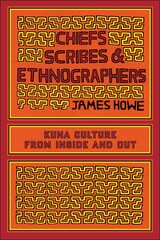
Chiefs, Scribes, and Ethnographers
Kuna Culture from Inside and Out
By James Howe
University of Texas Press, 2009
The Kuna of Panama, today one of the best known indigenous peoples of Latin America, moved over the course of the twentieth century from orality and isolation towards literacy and an active engagement with the nation and the world. Recognizing the fascination their culture has held for many outsiders, Kuna intellectuals and villagers have collaborated actively with foreign anthropologists to counter anti-Indian prejudice with positive accounts of their people, thus becoming the agents as well as subjects of ethnography. One team of chiefs and secretaries, in particular, independently produced a series of historical and cultural texts, later published in Sweden, that today still constitute the foundation of Kuna ethnography. As a study of the political uses of literacy, of western representation and indigenous counter-representation, and of the ambivalent inter-cultural dialogue at the heart of ethnography, Chiefs, Scribes, and Ethnographers addresses key issues in contemporary anthropology. It is the story of an extended ethnographic encounter, one involving hundreds of active participants on both sides and continuing today.
[more]
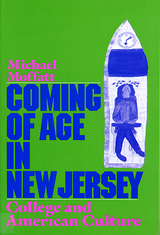
Coming of Age in New Jersey
College and American Culture
Moffatt, Michael
Rutgers University Press, 1989
Coming of Age is about college as students really know it and--often--love it. To write this remarkable account, Michael Moffatt did what anthropologists usually do in more distant cultures: he lived among the natives. His findings are sometimes disturbing, potentially controversial, but somehow very believable. Coming of Age is a vivid slice of life of what Moffatt saw and heard in the dorms of a typical state university, Rutgers, in the 1980s. It is full of student voices: naive and worldy-wise, vulgar and polite, cynical, humorous, and sometimes even idealistic. But it is also about American culture more generally: individualism, friendship, community, bureaucracy, diversity, race, sex, gender, intellect, work, and play. As an example of an ethnography written about an anthropologist's own culture, this book is an uncommon one. As a new and revealing perspective on the much-studied American college student, it is unique.
[more]
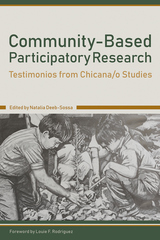
Community-Based Participatory Research
Testimonios from Chicana/o Studies
Edited by Natalia Deeb-Sossa; Foreword by Louie F. Rodriguez
University of Arizona Press, 2019
Members of communities of color in the United States often struggle for equity, autonomy, survival, and justice. Community-Based Participatory Research is an edited volume from activist-scholars who present personal testimonies showcasing how community-based participatory research (CBPR) can lead to sustainable change and empowerment. Editor Natalia Deeb-Sossa has chosen contributors whose diverse interdisciplinary projects are grounded in politically engaged research in Chicanx and Latinx communities. The scholars’ advocacy work is a core component of the research design of their studies, challenging the idea that research needs to be neutral or unbiased.
The testimonies tell of projects that stem from community demands for truly collaborative research addressing locally identified issues and promoting community social change. Contributors share their personal experiences in conducting CBPR, focusing on the complexities of implementing this method and how it may create sustainable change and community empowerment. Along with a retrospective analysis of how CBPR has been at the center of the Chicana/o Movement and Chicana/o studies, the book includes a discussion of consejos y advertencias (advice and warnings).
The most knowledgeable people on community issues are the very members of the communities themselves. Recognizing a need to identify the experiences and voices (testimonios) of communities of color, activist-scholars showcase how to incorporate the perspectives of the true experts: the poor, women, farmworkers, students, activists, elders, and immigrants.
The testimonies tell of projects that stem from community demands for truly collaborative research addressing locally identified issues and promoting community social change. Contributors share their personal experiences in conducting CBPR, focusing on the complexities of implementing this method and how it may create sustainable change and community empowerment. Along with a retrospective analysis of how CBPR has been at the center of the Chicana/o Movement and Chicana/o studies, the book includes a discussion of consejos y advertencias (advice and warnings).
The most knowledgeable people on community issues are the very members of the communities themselves. Recognizing a need to identify the experiences and voices (testimonios) of communities of color, activist-scholars showcase how to incorporate the perspectives of the true experts: the poor, women, farmworkers, students, activists, elders, and immigrants.
[more]
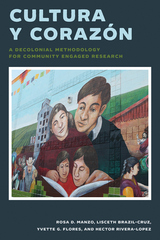
Cultura y Corazón
A Decolonial Methodology for Community Engaged Research
Rosa D. Manzo, Lisceth Brazil-Cruz, Yvette G. Flores, and Hector Rivera-Lopez
University of Arizona Press, 2020
Cultura y Corazón is a research approach and practice that is rooted in the work of Latinx and Chicanx scholars and intellectuals. The book documents best practices for Community Based and Participatory Action Research (CBPAR), which is both culturally attuned and scientifically demonstrated. This methodology takes a decolonial approach to engaging community members in the research process and integrates critical feminist and indigenous epistemologies.
Cultura y Corazón presents case studies from the authors’ work within the fields of education and health. It offers key strategies to working in partnership with marginalized Latinx communities that are grounded in deep respect for the communities’ cultures and lived experiences. This book is intended for students, researchers, and practitioners who want to work with vulnerable populations through a community-based approach that truly respects and integrates culture, values, and funds of knowledge.
Cultura y Corazón presents case studies from the authors’ work within the fields of education and health. It offers key strategies to working in partnership with marginalized Latinx communities that are grounded in deep respect for the communities’ cultures and lived experiences. This book is intended for students, researchers, and practitioners who want to work with vulnerable populations through a community-based approach that truly respects and integrates culture, values, and funds of knowledge.
[more]

Immersion
A Writer's Guide to Going Deep
Ted Conover
University of Chicago Press, 2016
Over three and a half decades, Ted Conover has ridden the rails with hoboes, crossed the border with Mexican immigrants, guarded prisoners in Sing Sing, and inspected meat for the USDA. His books and articles chronicling these experiences, including the award-winning Newjack: Guarding Sing Sing, have made him one of the premier practitioners of immersion reporting.
In immersion reporting—a literary cousin to ethnography, travel writing, and memoir—the writer fully steps into a new world or culture, participating in its trials, rites, and rituals as a member of the group. The end results of these firsthand experiences are familiar to us from bestsellers such as Nickel and Dimed and Behind the Beautiful Forevers. But in a world of wary strangers, where does one begin?
Conover distills decades of knowledge into an accessible resource aimed at writers of all levels. He covers how to “get into” a community, how to conduct oneself once inside, and how to shape and structure the stories that emerge. Conover is also forthright about the ethics and consequences of immersion reporting, preparing writers for the surprises that often surface when their piece becomes public. Throughout, Conover shares anecdotes from his own experiences as well as from other well-known writers in this genre, including Alex Kotlowitz, Anne Fadiman, and Sebastian Junger. It’s a deep-in-the-trenches book that all aspiring immersion writers should have in hand as they take that first leap into another world.
In immersion reporting—a literary cousin to ethnography, travel writing, and memoir—the writer fully steps into a new world or culture, participating in its trials, rites, and rituals as a member of the group. The end results of these firsthand experiences are familiar to us from bestsellers such as Nickel and Dimed and Behind the Beautiful Forevers. But in a world of wary strangers, where does one begin?
Conover distills decades of knowledge into an accessible resource aimed at writers of all levels. He covers how to “get into” a community, how to conduct oneself once inside, and how to shape and structure the stories that emerge. Conover is also forthright about the ethics and consequences of immersion reporting, preparing writers for the surprises that often surface when their piece becomes public. Throughout, Conover shares anecdotes from his own experiences as well as from other well-known writers in this genre, including Alex Kotlowitz, Anne Fadiman, and Sebastian Junger. It’s a deep-in-the-trenches book that all aspiring immersion writers should have in hand as they take that first leap into another world.
[more]
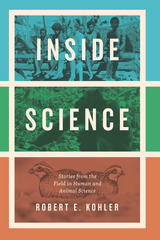
Inside Science
Stories from the Field in Human and Animal Science
Robert E. Kohler
University of Chicago Press, 2019
Context and situation always matter in both human and animal lives. Unique insights can be gleaned from conducting scientific studies from within human communities and animal habitats. Inside Science is a novel treatment of this distinctive mode of fieldwork. Robert E. Kohler illuminates these resident practices through close analyses of classic studies: of Trobriand Islanders, Chicago hobos, corner boys in Boston’s North End, Jane Goodall’s chimpanzees of the Gombe Stream Reserve, and more. Intensive firsthand observation; a preference for generalizing from observed particulars, rather than from universal principles; and an ultimate framing of their results in narrative form characterize these inside stories from the field.
Resident observing takes place across a range of sciences, from anthropology and sociology to primatology, wildlife ecology, and beyond. What makes it special, Kohler argues, is the direct access it affords scientists to the contexts in which their subjects live and act. These scientists understand their subjects not by keeping their distance but by living among them and engaging with them in ways large and small. This approach also demonstrates how science and everyday life—often assumed to be different and separate ways of knowing—are in fact overlapping aspects of the human experience. This story-driven exploration is perfect for historians, sociologists, and philosophers who want to know how scientists go about making robust knowledge of nature and society.
Resident observing takes place across a range of sciences, from anthropology and sociology to primatology, wildlife ecology, and beyond. What makes it special, Kohler argues, is the direct access it affords scientists to the contexts in which their subjects live and act. These scientists understand their subjects not by keeping their distance but by living among them and engaging with them in ways large and small. This approach also demonstrates how science and everyday life—often assumed to be different and separate ways of knowing—are in fact overlapping aspects of the human experience. This story-driven exploration is perfect for historians, sociologists, and philosophers who want to know how scientists go about making robust knowledge of nature and society.
[more]
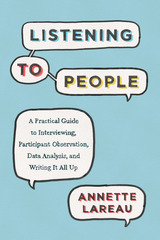
Listening to People
A Practical Guide to Interviewing, Participant Observation, Data Analysis, and Writing It All Up
Annette Lareau
University of Chicago Press, 2021
A down-to-earth, practical guide for interview and participant observation and analysis.
In-depth interviews and close observation are essential to the work of social scientists, but inserting one’s researcher-self into the lives of others can be daunting, especially early on. Esteemed sociologist Annette Lareau is here to help. Lareau’s clear, insightful, and personal guide is not your average methods text. It promises to reduce researcher anxiety while illuminating the best methods for first-rate research practice.
As the title of this book suggests, Lareau considers listening to be the core element of interviewing and observation. A researcher must listen to people as she collects data, listen to feedback as she describes what she is learning, listen to the findings of others as they delve into the existing literature on topics, and listen to herself in order to sift and prioritize some aspects of the study over others. By listening in these different ways, researchers will discover connections, reconsider assumptions, catch mistakes, develop and assess new ideas, weigh priorities, ponder new directions, and undertake numerous adjustments—all of which will make their contributions clearer and more valuable.
Accessibly written and full of practical, easy-to-follow guidance, this book will help both novice and experienced researchers to do their very best work. Qualitative research is an inherently uncertain project, but with Lareau’s help, you can alleviate anxiety and focus on success.
In-depth interviews and close observation are essential to the work of social scientists, but inserting one’s researcher-self into the lives of others can be daunting, especially early on. Esteemed sociologist Annette Lareau is here to help. Lareau’s clear, insightful, and personal guide is not your average methods text. It promises to reduce researcher anxiety while illuminating the best methods for first-rate research practice.
As the title of this book suggests, Lareau considers listening to be the core element of interviewing and observation. A researcher must listen to people as she collects data, listen to feedback as she describes what she is learning, listen to the findings of others as they delve into the existing literature on topics, and listen to herself in order to sift and prioritize some aspects of the study over others. By listening in these different ways, researchers will discover connections, reconsider assumptions, catch mistakes, develop and assess new ideas, weigh priorities, ponder new directions, and undertake numerous adjustments—all of which will make their contributions clearer and more valuable.
Accessibly written and full of practical, easy-to-follow guidance, this book will help both novice and experienced researchers to do their very best work. Qualitative research is an inherently uncertain project, but with Lareau’s help, you can alleviate anxiety and focus on success.
[more]
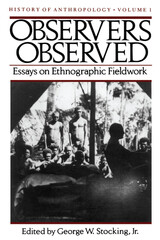
Observers Observed
Essays on Ethnographic Fieldwork
Edited by George W. Stocking, Jr.
University of Wisconsin Press, 1985
History of Anthropology is a new series of annual volumes, each of which will treat an important theme in the history of anthropological inquiry. For this initial volume, the editors have chosen to focus on the modern cultural anthropology: intensive fieldwork by "participant observation." Observers Observed includes essays by a distinguished group of historians and anthropologists covering major episodes in the history of ethnographic fieldwork in the American, British, and French traditions since 1880. As the first work to investigate the development of modern fieldwork in a serious historical way, this collection will be of great interest and value to anthropologist, historians of science and the social sciences, and the general readers interested in the way in which modern anthropologists have perceived and described the cultures of "others." Included in this volume are the contributions of Homer G. Barnett, University of Oregon; James Clifford, University of California, Santa Cruz; Douglas Cole, Simon Frazer University; Richard Handler, Lake Forest College; Curtis Hinsley, Colgate University; Joan Larcom, Mount Holyoke College; Paul Rabinow, University of California, Berkeley; and the editor.
[more]

A Place on the Corner
Elijah Anderson
University of Chicago Press, 1978
"Anderson's mix of the language of sociology and the more colorful street idiom makes a complex social phenomenon accessible to a broad audience. . . . An important work."—Gerald Lee Dillingham, Contemporary Sociology
[more]

A Place on the Corner, Second Edition
Elijah Anderson
University of Chicago Press, 2004
This paperback edition of A Place on the Corner marks the twenty-fifth anniversary of Elijah Anderson's sociological classic, a study of street corner life at a local barroom/liquor store located in the ghetto on Chicago's South Side. Anderson returned night after night, month after month, to gain a deeper understanding of the people he met, vividly depicting how they created—and recreated—their local stratification system. In addition, Anderson introduces key sociological concepts, including "the extended primary group" and "being down." The new preface and appendix in this edition expand on Anderson's original work, telling the intriguing story of how he went about his field work among the men who frequented Jelly's corner.
[more]
READERS
Browse our collection.
PUBLISHERS
See BiblioVault's publisher services.
STUDENT SERVICES
Files for college accessibility offices.
UChicago Accessibility Resources
home | accessibility | search | about | contact us
BiblioVault ® 2001 - 2024
The University of Chicago Press









